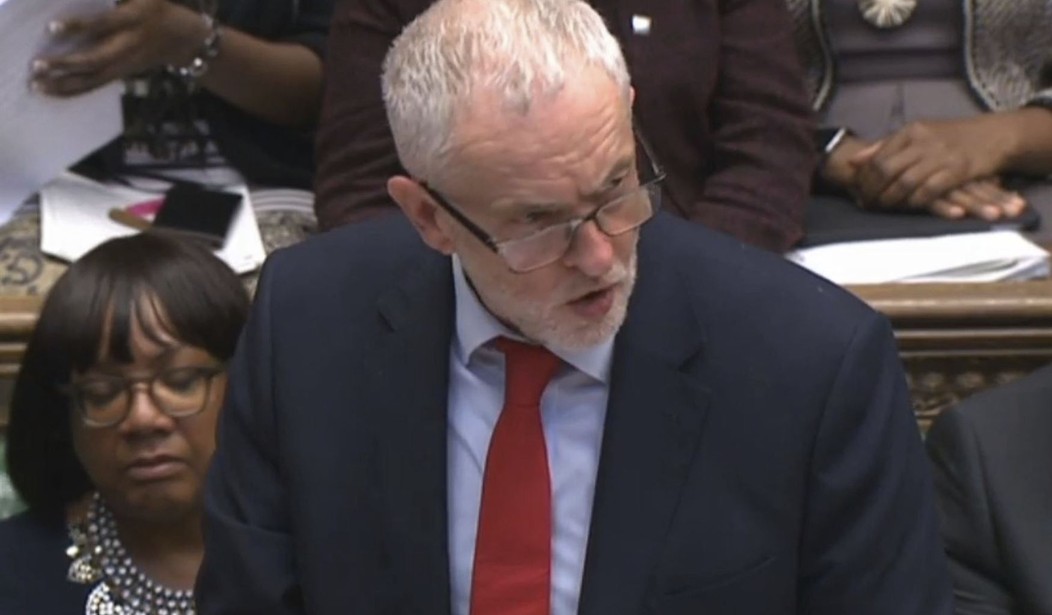As Cortney reported on Wednesday evening, British Prime Minister Theresa May has survived a challenge to her leadership by winning a vote of no confidence, triggered by a petition signed by a critical mass (48 signatories, under party rules) of Conservative Members of Parliament. Because she prevailed, another such challenge cannot be mounted in the next calendar year. It's also important to note that this was an internal party dispute, threatening her role as leader of the Tories; it was not a wide Parliamentary vote of no confidence, under which the government would have been dissolved and new elections held, had May lost.
The immediate upshot is that the Prime Minister lives to fight another day, even as her standing has been diminished by more than one-third of her fellow partisans voting against her. The British political media's expectation was that if she could hold the number of dissenters well below 100, she could actually have emerged strengthened. The final tally was well above that threshold, however -- an ominous sign for the controversial Brexit deal she's been negotiating:
117 votes of no confidence among MP’s from May’s own party. She survives, but her hand is weakened. https://t.co/3DfnwdknMu
— Guy Benson (@guypbenson) December 12, 2018
Here's the PM's public statement following her potentially Pyrrhic victory:
“A significant number of colleagues did cast a vote against me and I have listened to what they said...So here is our renewed mission -- delivering the Brexit that people voted for, bringing the country back together and building a country that truly works for everyone."
The bigger picture question is whether she can "deliver the Brexit that people voted for" in a manner that can win support in Parliament. At the moment, no plan or course of action appears to have the backing of a majority. Some Remainers are pushing for a new referendum. Some Brexiteers seem resigned to no deal at all, leading to a potentially very painful "crash out" when the March deadline arrives. Others favor May's negotiated plan (on which the Europeans are digging in), while still others prefer an even more EU-favorable approach. It's a mess, and given the various factions of opposition to May's leadership on this issue, it's unclear whether any plan exists that could plausibly cobble together a coalition to pass it. Public opinion is similarly messy and incoherent. Amid the Tory turmoil, Commentary's Noah Rothman made exactly the point that's been gnawing at me throughout this ordeal:
Recommended
Good lord, Tories. Find someone else before you give Corbyn an opening. What's the existential threat? The Continent or a Soviet/Hamas sympathizer in No. 10?
— Noah Rothman (@NoahCRothman) December 12, 2018
Could infighting lead to inaction, and therefore a painful, disruptive and unpopular break with the EU? Voters would likely blame the party in power, and the opposition could be empowered by public discontent. That might be a risk worth taking under more normal circumstances, but the Labour Party doesn't have a normal Prime Minister-in-waiting as its current leader. Labour has Jeremy Corbyn, who is a genuinely radical leftist and an anti-American terrorist sympathizer. It's frightening, especially given the last election's close shave. I fully understand the desire to ensure that the UK's break from the EU is -- in accordance with voters' will -- as robust as possible. Britons want their sovereignty back. But could wrangling over the contours and provisions of an imperfect Brexit deal result in a one-two punch of an ugly Brexit, an angry electorate, and Mr. Corbyn at No. 10 Downing Street? That would be catastrophic. It's possible that May could salvage this process by renegotiating a stronger deal that could mollify skeptics on her right flank, but even if she could somehow satisfy her own coalition, would the Europeans be willing to play ball? It doesn't look like it:
Top European Union officials on Tuesday ruled out any renegotiation of the divorce agreement with Britain as Prime Minister Theresa May launched her fight to save her Brexit deal by lobbying leaders in Europe's capitals. May began her quest over breakfast with Dutch counterpart Mark Rutte, a day after she abandoned a vote in the U.K. Parliament to secure support for the agreement thrashed out with the EU over more than a year, sensing that it would be rejected in London "by a significant margin."..."There is no room whatsoever for renegotiation," Juncker told EU lawmakers in Strasbourg, France, as he briefed them on the summit. Juncker, who is set to meet May on Tuesday evening, underlined that "the deal we have achieved is the best deal possible. It is the only deal possible."
This sort of intransigence and arrogance will certainly remind Brexit supporters of why they're so eager to extricate themselves from the grasp of bureaucrats in Brussels, but it also presents a thorny dilemma for May. If the existing deal cannot pass in London, and will not be altered by EU officials, she's stuck. I asked a plugged-in British friend about what the likeliest outcome is at this point. Answer: "Long story short, nobody knows anything."
























Join the conversation as a VIP Member